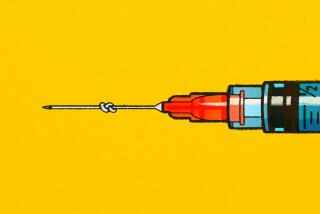War on Wrinkles : Cosmetics Makers Capitalize on Druglike Ingredients in Wake of Retin-A
- Share via
HERE’S A new wrinkle in the old anti-aging game. Riding the Zeitgeist of the popular line-diminishing acne drug Retin-A, small cosmetics manufacturers are emphasizing the prescription-druglike ingredients in their products.
Dozens of multimillion-dollar cosmetics firms such as Lancome and Revlon were forced to stop making anti-aging promises last year after the U.S. Food and Drug Administration threatened to seize any cosmetics whose ads or labels made druglike claims--that is, that the products somehow alter the structure or function of the skin. By not making written claims that conflict with FDA guidelines and by sticking to ingredients approved for over-the-counter use, small companies hope to avoid this problem.
Consider, for instance, the cosmetic lotion Derm-A-Gel, formulated and marketed by Dr. James Fulton, a Newport Beach dermatologist, who says his product will soften skin and smooth wrinkles after three to six months. He likens its results to those of Retin-A. Fulton, a medical resident working with Dr. Albert Kligman at the University of Pennsylvania when Kligman discovered the anti-aging effects of Retin-A, used research from those studies to develop Derm-A-Gel.
The new product contains a form of Vitamin A approved for use in cosmetics and, thus, weaker than the Vitamin A acid in Retin-A. Fulton says his product “takes longer to work but will not cause the severe scaling and redness associated with Retin-A.” Derm-A-Gel, sold at Fulton’s Acne Research Institute in Newport Beach and Lady Dee’s Corrective Skin Care Studio in Los Angeles, will reach drugstores at the end of the year, he says.
Fighting wrinkles via the immune system is another druglike approach to cosmetics. New York-based Morris Herstein, former director of Estee Lauder research and development and now an independent cosmetic industry consultant, says “there’s no doubt there is a relationship between the immune system and skin aging. If we can stimulate or protect the immune system with a cosmetic, that’s a big step.”
To that end, large cosmetics companies are investigating Nayad, a new cosmetic ingredient that was developed from highly purified active yeasts and reportedly stimulates the immune system. James Wood, president of Palo Alto’s ImmuDyne Inc., which markets the ingredient, says that when applied in a cream, Nayad will cause the body to defend itself against biological or sun-induced aging. One of the first creams containing Nayad is being sold by facialist Louise Bianco at her West Los Angeles skin-care salon.
Durk Pearson and Sandy Shaw of Los Angeles, authors of the controversial best-selling book “Life Extensions,” introduced New Feeling lotion in February and have since sold more than 20,000 bottles in health food and vitamin stores. The cosmetic contains alpha-hydroxy acids, which smoothe wrinkles when used in high concentrations. Like Vitamin A acid, these concentrations are available only by prescription. Pearson, a former aerospace engineer, contends that the levels of alpha-hydroxy acids contained in the lotion are high enough to dissolve dead outer layers of the skin, eliminating fine lines and wrinkles on the surface. Some critics say, however, that scrubbing with a loofah has the same effect.
These new products continue to blur the lines between cosmetics and drugs. But will anything short of a prescription drug win the war against aging skin? There are no conclusive answers, but so far, the wrinkles seem to be winning all the battles.





